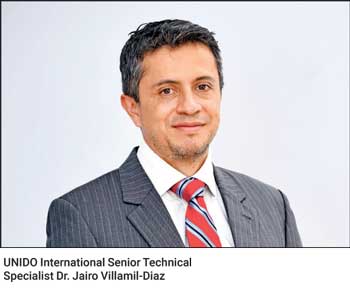Tuesday Mar 03, 2026
Tuesday Mar 03, 2026
Tuesday, 8 August 2023 00:00 - - {{hitsCtrl.values.hits}}
 In an uncertain economic landscape, companies have accepted environmentally sustainable business models as an effective way of utilising resources and reducing waste at the time of consumption. Breaking away from the linear “take-make-dispose” concept has been challenging due to high costs and a lack of information and technology required to transform production. The traditional linear economic model is about choosing profit over sustainability as raw materials are made into products that consumers use until discarding them as waste.
In an uncertain economic landscape, companies have accepted environmentally sustainable business models as an effective way of utilising resources and reducing waste at the time of consumption. Breaking away from the linear “take-make-dispose” concept has been challenging due to high costs and a lack of information and technology required to transform production. The traditional linear economic model is about choosing profit over sustainability as raw materials are made into products that consumers use until discarding them as waste.
In Sri Lanka, SMEs play a vital role in contributing to national economic growth due to their labour intensiveness and wide use of materials for production. The challenges that exist in terms of low levels of technology, production, and value additions prove that sustainability is a desirable profit-making solution. An article on the role of SMEs in the Industrial Analytics platform by UNIDO mentions that SMEs are more flexible and responsive and can play a leading role as drivers of change. Their ability to adopt a “green solution” seems to be vibrant, despite the inherent challenges in transitioning to a circular economy”.
A circular economy creates a closed-loop system where products and materials are continuously reused, repaired, and recycled to create new value. It is intrinsic in the design and production stages of the supply chain for the reuse and remanufacturing of products that are high in competition, reduce costs, and open new markets. Recognising the benefits of a circular economy, SMEs are transitioning towards creating greener solutions for their business.
The United Nations Industrial Development Organisation (UNIDO) is at the helm of piloting circular economic solutions for SMEs in developing countries along international value chains. Drawing from successful global experiences, UNIDO plays a pivotal role in assisting countries’ transition towards circular economic models. The transition to a circular economy is based on agreed practices by stakeholders, improved designs, and better standards-keeping economic rationale.
According to International UNIDO Senior Technical Specialist Dr. Jairo Villamil-Diaz, “more countries are successfully embracing the circular economy mind-set in industries like agri-food, fashion, tourism, health, and personal care. This has improved economic conditions, reduced waste, and a smaller carbon footprint. Sri Lanka can achieve the same.”
The Transfer of Environmentally Sound Technologies (TEST) program, implemented for the Danube River basin, is a key initiative by UNIDO to facilitate resource-efficient and cleaner production methods for industries and SMEs. The program was to treat the water pollution that was released into the Danube River by introducing sustainable production methods to companies.
Additionally, UNIDO actively advocates the development of eco-industrial parks worldwide, a concept that could be introduced to Sri Lanka. The eco-Industrial parks project in Vietnam for instance successfully demonstrated reduced greenhouse gas emissions, improved water management, and the adoption of sustainable technologies.
A greener economy can be met by companies ready to make a difference in their product supply chain. By doing so, a circular economy is more feasible and impactful on the consumer because companies are altering their business to join the conscious consumer and be part of the global shift towards sustainable consumption and production. These patterns of business are also fulfilling the United Nations Sustainable Development Goal (SDG) 12 and SDG Goal 9.
Sri Lanka may only be at the inception stage of the circular economy model as UNIDO in Sri Lanka promotes sustainable eco-labelling together with the National Cleaner Production Centre (NCPC). Eco-labelling is the first national green product certification scheme, a voluntary method of environmental performance certification and labelling. There is an increase in companies and SMEs obtaining eco-labelling certification as they are ready to enhance the quality and sustainability of their products as a way to reach new markets locally and internationally. As more companies are embracing technology-driven concepts in line with the circular economy model, industries are becoming more resourceful and energy-efficient in the long term.